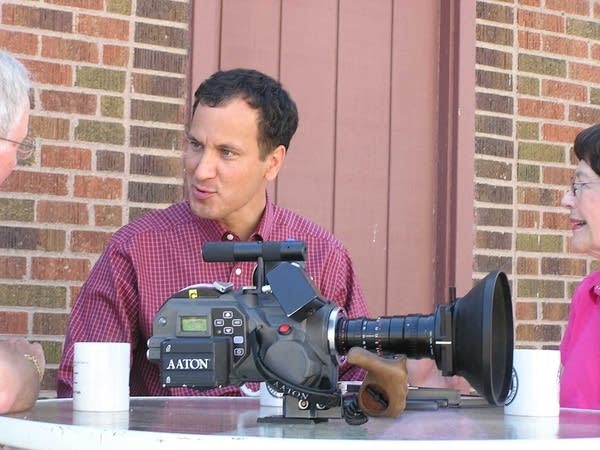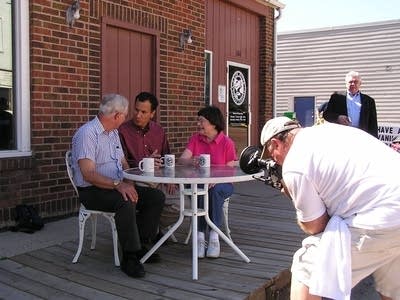Kennedy keeps distance from President Bush
Go Deeper.
Create an account or log in to save stories.
Like this?
Thanks for liking this story! We have added it to a list of your favorite stories.

Watertown, Minnesota, west of the Twin Cities, is home to Kennedy, who currently represents the 6th District in Congress. On a sultry summer morning, Kennedy is filming commercials for his U.S. Senate campaign.
Crews are getting shots of Kennedy chatting with small groups of veterans in a city park where Watertown's war memorials are placed. A makeup artist is on hand to ensure Kennedy's hair and face look good.

Earlier in the day, the camera recorded Kennedy sitting at a table outside a coffee shop along Watertown's main street, talking with a man and woman.
These two scenes have yet to make their way into Kennedy campaign commercials which have been running on TV stations throughout Minnesota.
Turn Up Your Support
MPR News helps you turn down the noise and build shared understanding. Turn up your support for this public resource and keep trusted journalism accessible to all.
One commercial the Kennedy campaign is airing features the Republican congressman selling himself as a bipartisan politician with a reputation for working across party lines -- and, in some cases, against President Bush.
"You've got to almost laugh out loud when you see this coming," says Norman Ornstein, a political analyst with The American Enterprise Institute in Washington D.C., who says he's been closely following Minnesota's 2006 Senate race.

"From somebody who was so proud at saying that he was there as a loyal Republican with the president, and who's voted with his leadership in Congress consistently over all this time," Ornstein says. "For anybody who's followed this process at all, the notion of this really independent guy is kind of amusing. But let's face it, a lot of people don't follow this process all of the time, so it might work."
When Kennedy was running for his second term in Congress, he played up his ties to President Bush. One 2002 Kennedy ad featured film of him walking side by side with Bush.
Ornstein says Kennedy isn't the only Republican candidate who is now seeking some distance from President Bush.
"They loved the president, and marched in lockstep with him when his approval rating was 90. They did the same when it was 80 and when it was 70, and it was 60 and even when it was 50," Ornstein says. "Now you've got a president at 38 percent, and it's not surprising that candidates are deciding to show their independence."
You've got to almost laugh out loud when you see this.
Despite his three terms in Congress, according to the polls, Kennedy is trailing the DFL candidate for Senate, Hennepin County Attorney Amy Klobuchar. A Star Tribune survey of likely voters in early July gave Klobuchar a nearly 20-percentage point edge over Kennedy.
GOP lobbyist Sarah Janecek says Republicans are disappointed, and that many Republicans think Kennedy's decision to distance himself from the White House is disingenuous.
"To some degree, I think, the Kennedy campaign has lost a little nerve," Janecek says. "Certainly Minnesota is a tough state, a divided state, a traditionally Democratic state. But now is not the time to be backing away from his solid support of the president and the war on terror. That's a miscalculation on the part of the campaign."
Pat Shortridge, Mark Kennedy's campaign manager, takes issue with the charge Kennedy is distancing himself from the president.
"Just because Mark doesn't share the Democrats' sort of strange obsession with the president, just because he doesn't seem to want to talk about the president 24/7, doesn't mean we're running from anybody," Shortridge says.
Shortridge accuses Democrats throughout the country of trying to turn the mid-term elections into a referendum on Bush's presidency. He says Kennedy won't play along.
"We're going to talk about Mark's record, we're going to talk about Mark's vision, we're going to talk about Mark's values," Shortridge says. "Call us old-fashioned, but in a race where Mark Kennedy's name is on the ballot, I think voters are going to expect that we're going to talk about exactly that -- Mark Kennedy."
Kennedy's latest ad addresses rising energy prices, with him calling for a suspension of the federal gas tax and an end to tax breaks for oil companies.
Democrats point out that Kennedy voted for President Bush's energy bill, which included tax breaks for oil companies. Last summer, Kennedy called the legislation a "common sense" bill that would bring down gas prices and promote conservation.

While Kennedy has so far not used President Bush in his 2006 campaign ads, he has tapped the White House to raise money. In December 2005, President Bush appeared at a Kennedy fundraiser that took in $1 million. Earlier this summer, first lady Laura Bush visited Minnesota and raised more than $500,000 for Kennedy.
With Klobuchar ahead in the polls, some political observers say Minnesota Democrats should be concerned about the possibility that national party leaders could redirect resources that had been earmarked for a contentious Senate battle in Minnesota, to other states where races appear to be closer.
Minnesota DFL Chairman Brian Melendez says he's confident Klobuchar will be elected. But he says local and national Democrats are taking nothing for granted.
"I do worry a little bit that Amy Klobuchar is going to trounce Mark Kennedy so clearly that resources will pull out," Melendez says. "Nobody is there yet, and I haven't heard anybody at the national level suggesting that it's time to pull resources out of Minnesota because this is a done deal. We still have three months to go. We've gotten Amy into the home stretch, but we need to keep fueling her campaign to get her home."
The editor of the Cook Political report, Jennifer Duffy, says national Republicans still view Minnesota's Senate race as a great opportunity for them.
"It is the Democrats' most vunerable seat right now, and take polls with a grain of salt," Duffy says.
Although Klobuchar and Kennedy have been traversing the state campaigning for Senate for more than a year, Duffy says to ordinary Minnesotans it's still early.
"I think it's going to be a great contest," Duffy predicts. "It's interesting that these fields have been set for quite some time. And yet, when I look at some of the most competitive races in the country, this is still one of the least developed. So, in some ways, in my view, it's only just begun."
Norman Ornstein, of The American Enterprise Institute says if polling continues to show Klobuchar with a heathy lead over Kennedy, Republicans may reassess their chances to win in 2006 in Minnesota.
"If it's pretty clear by mid to late September that there's no trend line moving either in a Republican direction or in a Kennedy direction in Minnesota, given the other serious battleground races out there, and what it will take for Democrats to get to the six seats they need, the Republicans trying to make sure that they don't lose more than three or four, we're likely to see the national attention and the national money go elsewhere," Ornstein says.
Regardless of what the campaigns do, Ornstein and other political observers say forces no one can control or predict could play a key role in the mid-term elections.
Another terrorist scare, a spike in energy prices, or news from Iraq -- any or all could change the face of the campaign between now and November.



